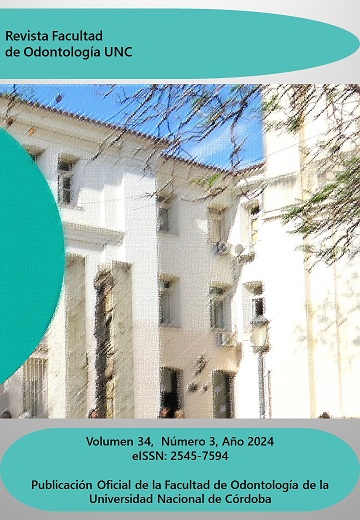Assessment of teaching-learning processes in the physiology subject of the Faculty of Dentistry (UNC)
Keywords:
Physiology FO-UNC, undergraduate students, cohort 2023, evaluation, teaching-learning processes.Abstract
The present work analyzed the evaluation of the second year students of the School of Dentistry on the pedagogical experiences in the course of Physiology during the 2023 academic year. Objective: to know the opinion of the students in relation to the undergraduate activities of the course. Material and methods: a Google form was used as a consultation tool in which 157 students were surveyed anonymously and voluntarily. The instrument was a questionnaire with quantitative items analyzed in absolute values and percentages per surveyed item. Qualitative assessments were also considered. Results: all items surveyed showed satisfactory results which contributed significantly to the improvement of educational strategies aimed at the 2024 cohort. Conclusions: The reflection carried out from the students' perspective on the performance of the teaching activity in the Chair of Physiology favored to continue optimizing the processes of disciplinary training that provides significant knowledge for the clinical activity of the future professional.
References
1-Pérez García, Á. La enseñanza online post pandemia: nuevos retos. Holos, 2, 1–13, 2021.
2-Barón Hernández CY, Caicedo Rojas E, «Transformación digital, un desafío en la educación superior», I, 20216(30):3–11
3-Fong JMN, Tsang LPM, Tan NCK, Salcedo D, Tan K. Effective online large-group teaching in health professions. education. Korean J Med Educ. 2022; 34(2):155-166.
4-Pakkies NE, Mtshali NG. Students' views on the block evaluation process: A descriptive analysis. Curations. 2016 Mar 30;39(1):1516.
5-Hernández-Falcón, DC, Vargas-Jiménez, A, Almuinas-Rivero, JL. La importancia de la evaluación de la eficiencia académica en las universidades. Rev. Cubana Edu. Superior [online]. 2020, 39, n.1[citado20240612] Epub 01-Abr-2020. ISSN 0257-4314.
6-Rodriguez, S. Auto-eficacia Docente, Motivación del Profesor y Estrategias de Enseñanza. Escritos de Psicología [online]. 2009, vol.3, n.1 [citado 2024-06-12], pp.1-7.
7-Watson S. Closing the feedback loop: Ensuring effective action from student feedback. Tertiary education and management 9.2. 2003: 145-157.
8-Van Wyk J, McLean M. Maximizing the value of feedback for individual facilitator and faculty development in a problem-based learning curriculum. Med Teach. 2007; 29(1): e26-31.
9-Hernández Pérez, AF. Los criterios de evaluación del aprendizaje en la educación superior. Perspectivas docentes, 2017, 28(63):60-68.
Downloads
Published
Issue
Section
License

This work is licensed under a Creative Commons Attribution-NonCommercial-ShareAlike 4.0 International License.
Aquellos autores/as que tengan publicaciones con esta revista, aceptan los términos siguientes:
- Los autores/as conservarán sus derechos de autor y garantizarán a la revista el derecho de primera publicación de su obra, el cuál estará simultáneamente sujeto a la Licencia de reconocimiento de Creative Commons que permite a terceros:
- Compartir — copiar y redistribuir el material en cualquier medio o formato
- La licenciante no puede revocar estas libertades en tanto usted siga los términos de la licencia
- Los autores/as podrán adoptar otros acuerdos de licencia no exclusiva de distribución de la versión de la obra publicada (p. ej.: depositarla en un archivo telemático institucional o publicarla en un volumen monográfico) siempre que se indique la publicación inicial en esta revista.
- Se permite y recomienda a los autores/as difundir su obra a través de Internet (p. ej.: en archivos telemáticos institucionales o en su página web) después del su publicación en la revista, lo cual puede producir intercambios interesantes y aumentar las citas de la obra publicada. (Véase El efecto del acceso abierto).

